Key takeaways
- SEO connects brands with the right audience, transforming marketing strategies into effective storytelling.
- Moz tools simplify SEO tasks such as keyword research, site audits, and providing insights into competitive link opportunities.
- Regular site audits and prioritizing high-impact fixes can lead to noticeable improvements in traffic and rankings.
- Aligning SEO efforts with user intent through tools like keyword explorer enhances content relevance and audience connection.
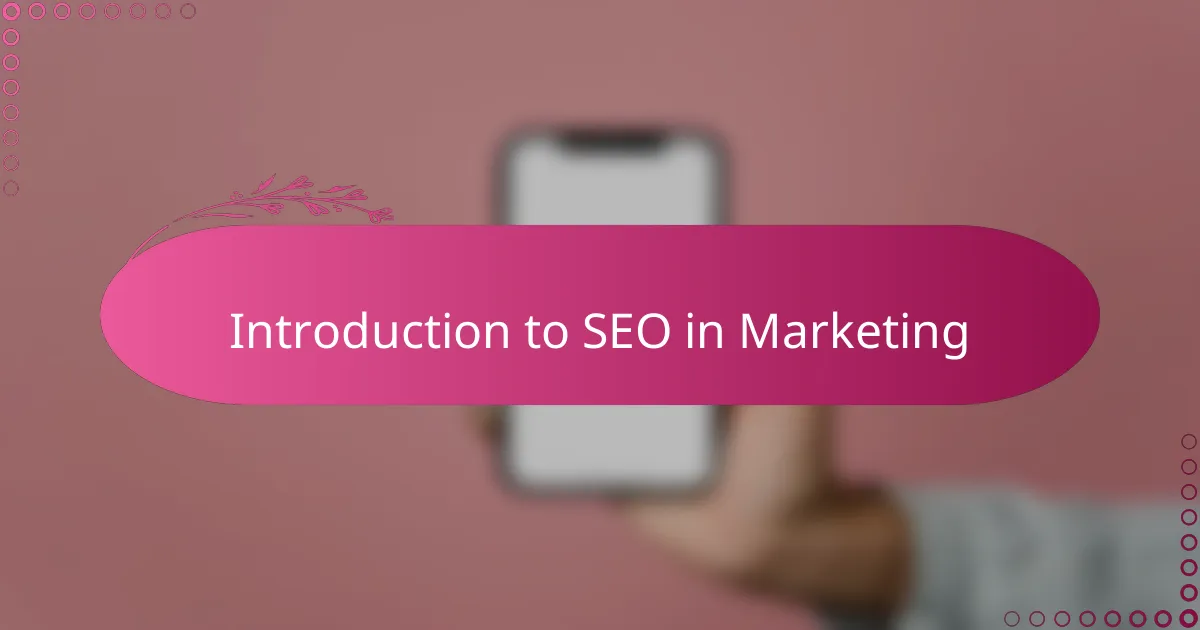
Introduction to SEO in Marketing
Search engine optimization, or SEO, is at the heart of effective marketing today. I remember when I first realized how crucial SEO was—not just for visibility, but for connecting the right audience to the right message. Have you ever wondered why some brands seem to pop up instantly when you search for something, while others get lost in the crowd?
To me, SEO isn’t just a technical tool; it’s a bridge between what customers are searching for and the value your brand offers. It’s fascinating how understanding and leveraging SEO can transform a marketing strategy from mediocre to exceptional. When done right, SEO feels less like a checklist and more like storytelling that speaks directly to the audience’s needs.
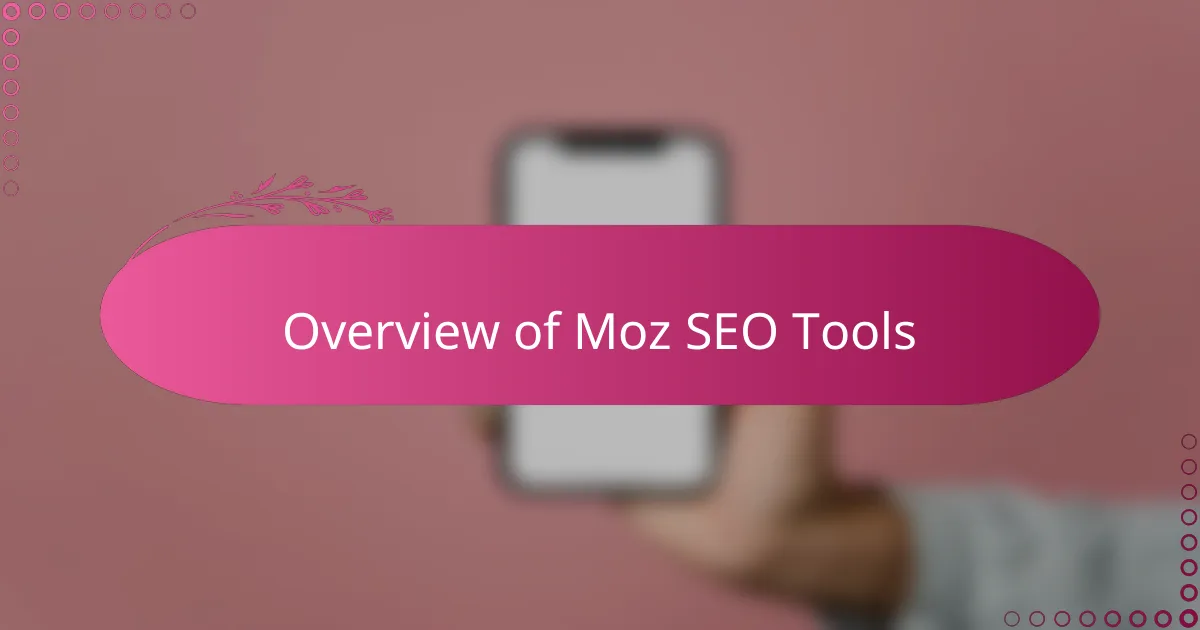
Overview of Moz SEO Tools
Moz SEO tools have always felt like my secret weapon in navigating the complex world of search rankings. From keyword research to site audits, Moz provides a comprehensive suite that simplifies what often feels overwhelming. Have you ever felt lost staring at endless SEO metrics? Moz’s user-friendly interface made those numbers suddenly make sense to me.
One feature I keep coming back to is Moz’s Domain Authority metric. It’s not just a score; it’s a benchmark that gave me a clear sense of where my website stood against competitors. This clarity helped me focus my efforts more strategically, instead of blindly chasing every shiny SEO tactic out there.
The keyword explorer is another gem in Moz’s toolkit. It’s like having a conversation with your audience before they even visit your site. I learned to spot the phrases people actually use, which transformed how I crafted content and targeted my campaigns. Isn’t it amazing when a tool helps you think less about SEO rules and more about genuine connection?
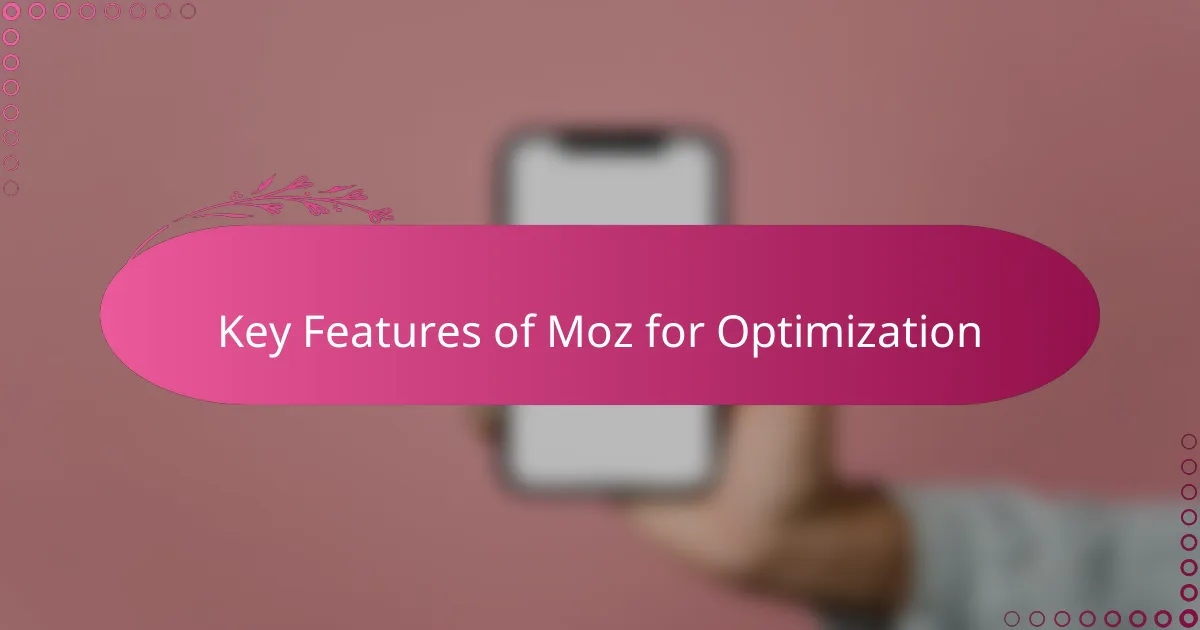
Key Features of Moz for Optimization
Moz’s site audit feature quickly became my go-to for spotting hidden issues that could tank my rankings. I remember feeling frustrated when my traffic dipped without knowing why, and this tool instantly highlighted problems like broken links and slow loading pages. Have you ever wished for a quick health check for your site? That’s exactly what Moz delivers.
Another standout for me is the page optimization suggestions. It’s like having an expert whisper in your ear, telling you precisely how to tweak your content for better search visibility. This feature helped me stop guessing and start improving with confidence—I could see tangible results almost immediately.
What truly sets Moz apart, though, is the way it integrates link analysis with competitive insights. Understanding who’s linking to my competitors and identifying quality link opportunities changed how I built my strategy. Instead of chasing every backlink, I focused on relationships that actually mattered, which felt way more authentic and effective.
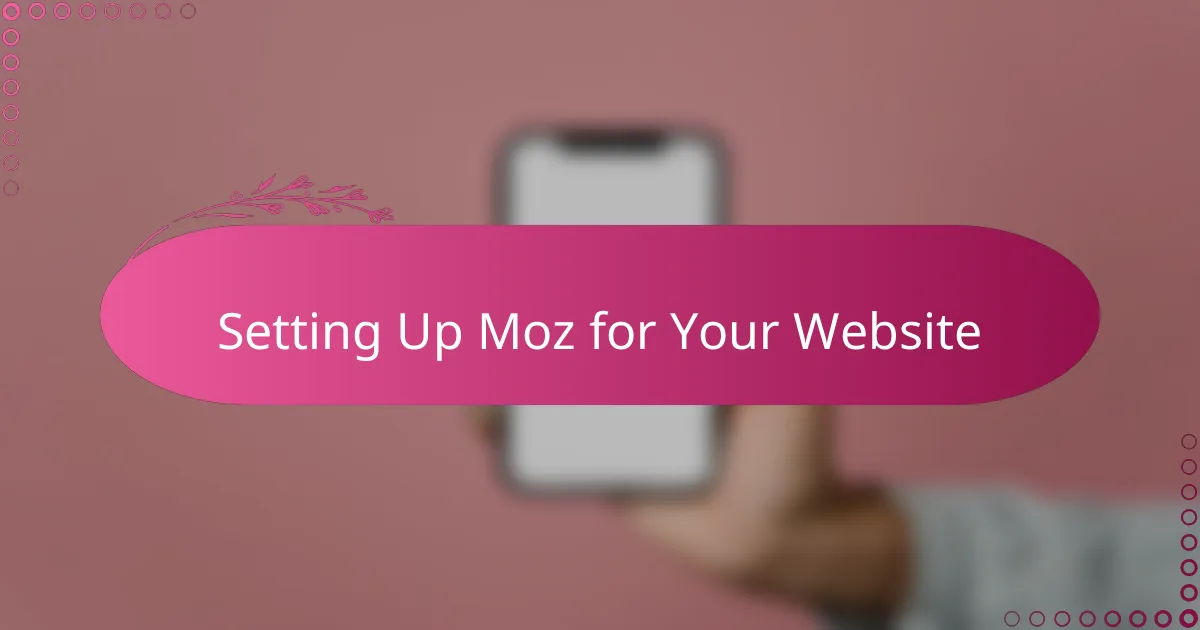
Setting Up Moz for Your Website
Getting started with Moz for your website felt a bit like unpacking a complicated toolbox. I remember logging in for the first time and being greeted by dashboards filled with numbers and charts. But once I connected my site by simply adding a tracking code or verifying it through Google Search Console, the maze started to clear up.
One thing I quickly learned was the importance of setting up site crawls. Moz’s automated scans gave me immediate insights into coding errors and SEO hurdles—things I didn’t even notice before. Have you ever been surprised by how many small issues can quietly drag down your site’s performance? Moz made it easy to spot those, helping me fix them before they turned into bigger problems.
Another feature worth mentioning is how Moz lets you customize your projects. By defining keywords and competitor sites early on, I could tailor the reports to focus on what really mattered for my goals. This personalization felt like having a GPS guiding me through the SEO landscape instead of wandering aimlessly in the dark.
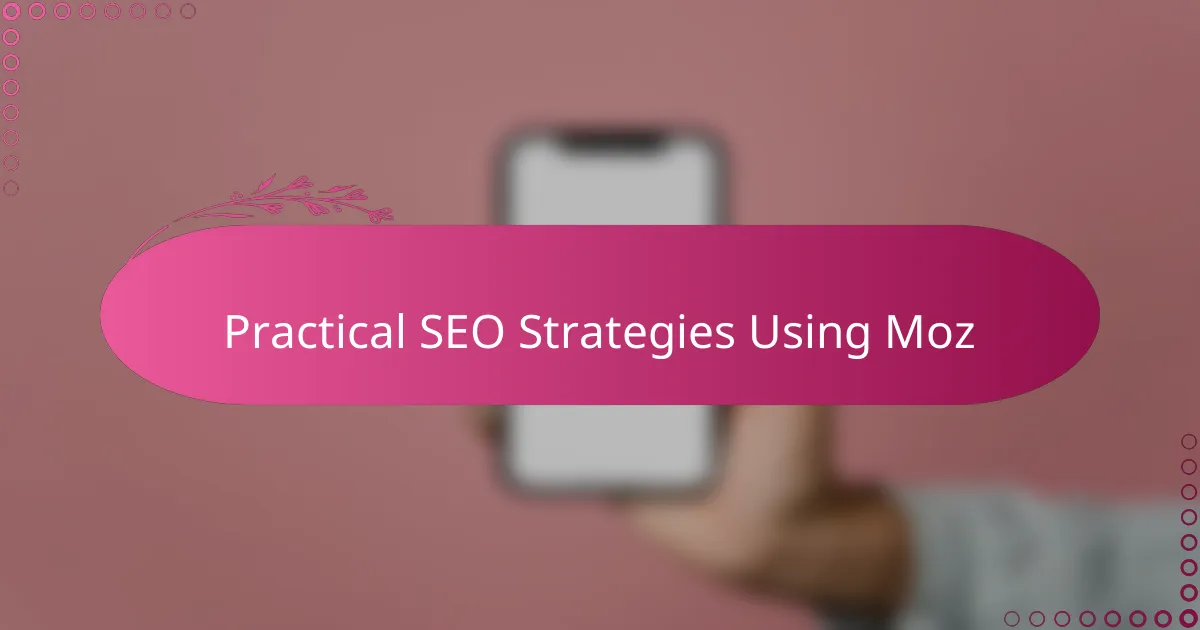
Practical SEO Strategies Using Moz
One of the strategies I found most practical with Moz was using the keyword research tool to uncover untapped opportunities. By diving into the keyword suggestions, I discovered less competitive phrases that still attracted a decent search volume. Have you ever noticed how targeting those ‘hidden gems’ can drastically improve your content’s reach without spending endless hours battling for top spots on highly competitive terms?
Another approach that worked wonders was running regular site audits through Moz. I made it a habit to review these reports weekly, which helped me nip emerging technical issues in the bud before they impacted rankings. It felt empowering to catch problems early—imagine spotting a broken link or slow-loading page before your visitors do!
Link analysis with Moz also shifted my strategy in unexpected ways. Instead of blindly pursuing backlinks, I started focusing on building relationships with sites that Moz highlighted as influential within my niche. This wasn’t just about numbers; it became about creating meaningful connections, which ultimately boosted not only my SEO but also my brand credibility. Have you tried prioritizing quality over quantity in link-building? For me, the results spoke volumes.
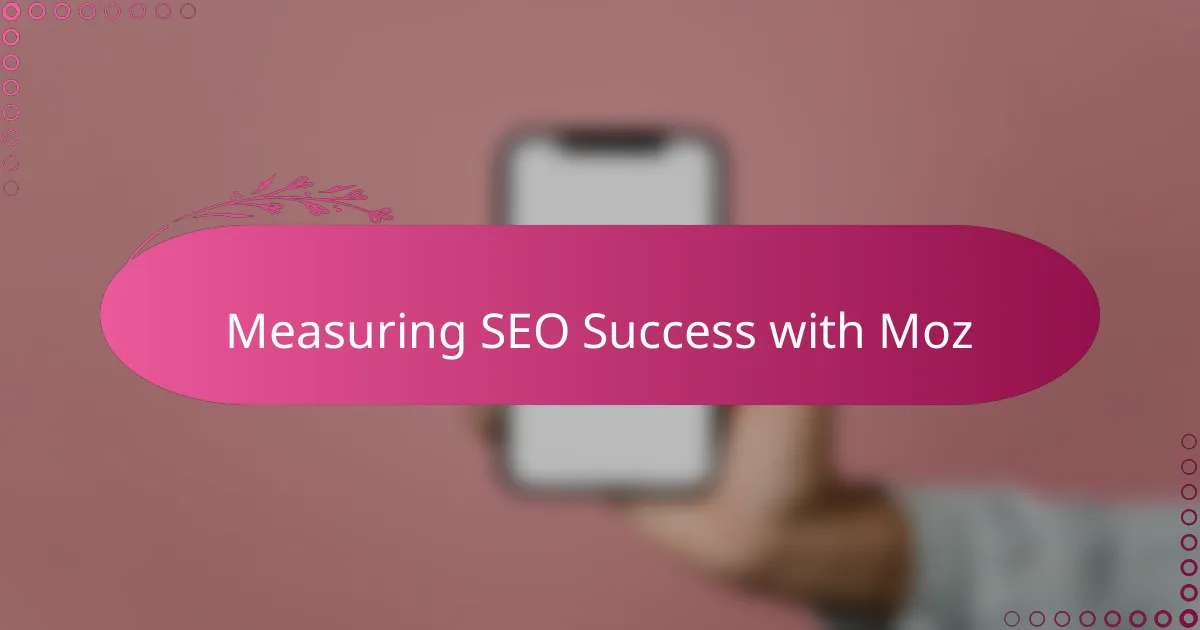
Measuring SEO Success with Moz
Measuring SEO success with Moz gave me a renewed sense of direction. When I first started tracking my site’s Domain Authority and keyword rankings regularly, I realized how these numbers weren’t just abstract—they were telling the story of my website’s growth. Have you ever felt that thrill when a steady climb in rankings confirms your hard work is paying off?
What really struck me is how Moz’s custom reports made performance metrics feel less like confusing data dumps and more like actionable insights. Seeing how my organic traffic responded to specific changes helped me fine-tune strategies faster than I expected. I found myself asking, “Why did this page suddenly drop, and what can I fix right now?” Moz’s tools gave me clear answers.
Also, the ability to benchmark against competitors truly changed the game for me. Watching how my site stacked up week by week motivated me to keep pushing forward, knowing exactly where the gaps were. It’s one thing to hope for better rankings, but it’s another to track your progress scientifically—and Moz made that possible.

Personal SEO Optimization Experience
Using Moz to optimize my SEO felt like unlocking a new level of understanding about how search engines actually rank content. At one point, I recall spending hours tweaking my site without much progress, but once I started paying close attention to the data Moz provided, the path became clearer. Have you ever experienced that moment when a complex problem suddenly feels solvable? That’s exactly what happened to me.
One thing that stuck with me was how Moz helped me prioritize tasks instead of trying to do everything at once. For example, catching a few high-impact technical fixes early on made a noticeable difference in traffic. It felt rewarding to see those small changes translate into real results. I began appreciating that SEO success isn’t about perfection but about consistent, focused improvements.
Another personal insight was realizing how crucial it is to align SEO efforts with actual user intent. The keyword explorer tool wasn’t just about rankings—it guided me to speak the language of my audience. Have you ever thought about what your ideal customer is really searching for? Moz made me feel like I had a direct line into their questions and needs, which transformed how I approached content creation.